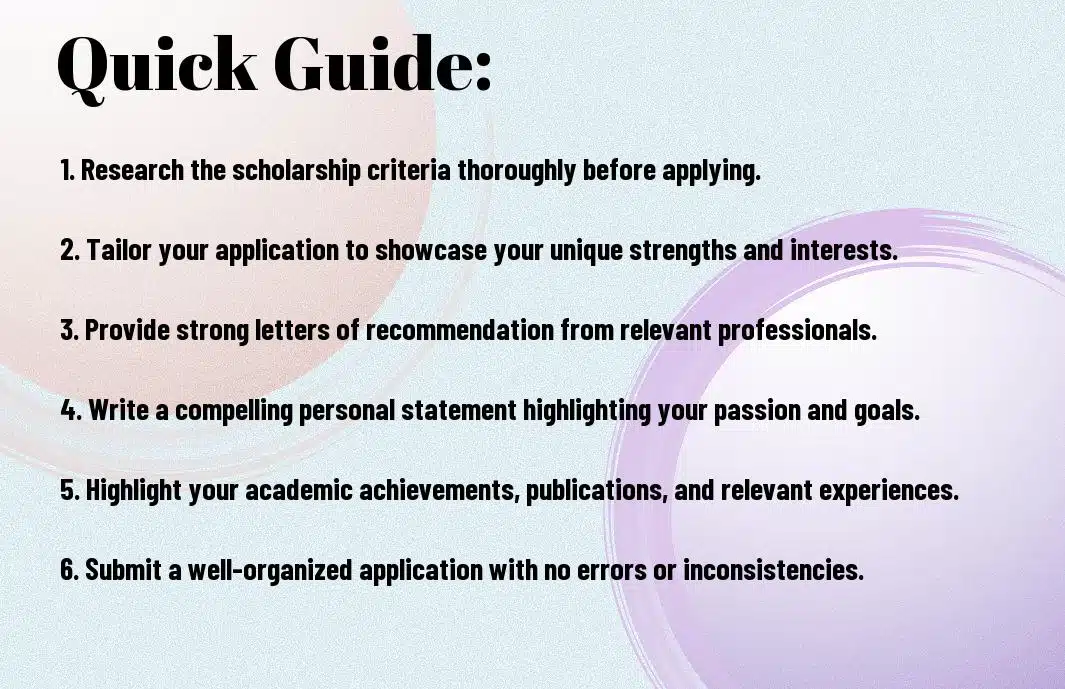Scholarship Application Just submitting a generic application won’t cut it when applying for a Ph.D. scholarship. To increase your chances of success, you need to showcase your unique skills, experiences, and passion for your chosen field. Our guide will provide you with valuable tips and insights on how to stand out and impress the selection committee. For more detailed information, check out How to Stand Out When Applying for a Funded PhD.
Key Takeaways:
- Research Proposal: Create a strong and innovative research proposal that clearly outlines the significance, objectives, and methodology of your study.
- Academic Excellence: Showcase your academic achievements, including previous research experience, publications, conference presentations, and relevant coursework.
- Letters of Recommendation: Obtain strong letters of recommendation that emphasize your research potential, academic abilities, and fit for the program.

Exploring Types of Ph.D. Scholarships
Any individual aspiring to pursue a Ph.D. program understands the significance of securing a scholarship to support their academic journey. There are various types of Ph.D. scholarships available, each with its own set of criteria and benefits. It is important to explore these options thoroughly to determine which best suits your academic and financial needs.
| Merit-Based Scholarships | Need-Based Scholarships |
| Subject-Specific Scholarships | International Scholarships |
Merit-Based Scholarships
Little is known about merit-based scholarships, which are awarded based on academic achievement, research potential, and other criteria that distinguish exceptional candidates. If you have a strong academic record and remarkable research capabilities, you may be eligible for such scholarships that can significantly alleviate the financial burden of pursuing a Ph.D.
Need-Based Scholarships
You must understand that need-based scholarships are awarded based on the financial need of the candidate. If you demonstrate financial need, you may qualify for scholarships that cover tuition fees, living expenses, or both, enabling you to focus solely on your Ph.D. studies without worrying about financial constraints.
Need-Based: It is crucial to provide accurate and detailed information about your financial situation when applying for need-based scholarships. Make sure to submit all required documents and proof to strengthen your application.
Subject-Specific Scholarships
Assuming you have a specific research interest or are pursuing a Ph.D. in a particular field, subject-specific scholarships can provide tailored financial assistance. These scholarships are often sponsored by organizations, universities, or governmental bodies with a keen interest in promoting research and innovation in a specific area.
Merit-Based: Subject-specific scholarships offer more targeted support for Ph.D. students, focusing on advancing research and knowledge in specialized fields. Be sure to explore all available options and align your application with the scholarship’s criteria and goals for maximum impact.
International Scholarships
Exploring international scholarships opens up opportunities for Ph.D. candidates to study abroad and collaborate with leading experts in their field. These scholarships are highly competitive but offer the chance to gain a global perspective, expand academic networks, and access resources not available in your home country. Subject-specific international scholarships may also be available for those focusing on specialized research areas.
SubjectSpecific: Pursuing international scholarships requires careful planning and preparation, including fulfilling language requirements, obtaining visas, and adjusting to a new academic and cultural environment. However, the rewards of an international Ph.D. experience can be immensely valuable for your academic and professional growth.
Essential Tips for a Standout Application
- Highlighting Academic Achievements: Any Ph.D. scholarship application should prominently feature your academic achievements. Be sure to showcase any honors, awards, publications, or research projects that demonstrate your excellence in your field.
- Demonstrating Research Potential: To stand out in your application, you must convincingly demonstrate your research potential. Highlight your research experience, skills, and interests to show the selection committee that you are capable of conducting high-quality research.
Highlighting Academic Achievements
Any Ph.D. scholarship application should prominently feature your academic achievements. Be sure to showcase any honors, awards, publications, or research projects that demonstrate your excellence in your field.
Demonstrating Research Potential
To stand out in your application, you must convincingly demonstrate your research potential. Highlight your research experience, skills, and interests to show the selection committee that you are capable of conducting high-quality research.
Crafting a Compelling Personal Statement
Potential Ph.D. scholarship recipients must craft a compelling personal statement that highlights their unique qualities, experiences, and motivations. Use this opportunity to explain why you are passionate about your research area and how your background makes you a strong candidate for the scholarship.
With a well-crafted personal statement, you can set yourself apart from other applicants and leave a lasting impression on the selection committee.
Securing Strong Letters of Recommendation
With strong letters of recommendation, you can provide the selection committee with valuable insights into your academic abilities, research potential, and personal qualities. Choose recommenders who know you well and can speak knowledgeably about your strengths and qualifications for the scholarship.
Letters of recommendation can significantly influence the outcome of your application, so make sure to select recommenders who can provide positive and detailed assessments of your capabilities.
Step-by-Step Guide to the Application Process
Despite the fierce competition for Ph.D. scholarships, a well-prepared application can make you stand out. Follow this step-by-step guide to navigate the process effectively.
| Researching Scholarship Opportunities | Meeting All Eligibility Requirements |
Researching Scholarship Opportunities |
Meeting All Eligibility Requirements |
If you are considering applying for a Ph.D. scholarship, start by researching various scholarship opportunities available. Look for scholarships that align with your research interests and academic achievements.
Application requirements vary for each scholarship, so ensure you meet all eligibility criteria before submitting your application. This includes academic qualifications, research experience, language proficiency, and any other specific requirements outlined by the scholarship provider.
Understanding the importance of a comprehensive application package is crucial in standing out among other applicants. This includes preparing a compelling research proposal, showcasing your academic achievements, and securing strong letters of recommendation.
Comprehensive preparation of your application package can significantly increase your chances of securing a Ph.D. scholarship. Make sure to tailor your application to each scholarship provider’s requirements and highlight your unique qualifications and research interests.
With the submission of your application, the process does not end there. Following up post-submission is crucial to ensure that all required documents have been received and to express your continued interest in the scholarship.
The post-submission follow-up should be done with professionalism and courtesy. Keep in touch with the scholarship provider to address any additional information they may require and to reiterate your enthusiasm for the opportunity.
Another important aspect to remember is to stay organized throughout the application process, keeping track of deadlines, requirements, and communication with scholarship providers. Good luck with your Ph.D. scholarship application!
Critical Factors in Scholarship Selection
Once again, the selection process for a Ph.D. scholarship can be highly competitive, with numerous qualified candidates vying for a limited number of opportunities. To stand out, it is crucial to pay attention to critical factors that are considered during the evaluation process. These factors can vary depending on the scholarship provider, but several key aspects are commonly assessed.
Academic Excellence and Intellectual Merit
Clearly, one of the primary factors in scholarship selection is academic excellence and intellectual merit. Your academic record, research experience, publications, and any honors or awards received will be carefully scrutinized. Demonstrating a strong foundation in your field of study is imperative to showcase your potential for success in advanced research.
Leadership Qualities and Community Service
Some scholarship providers also place a high value on leadership qualities and community service. In addition to academic achievements, they are interested in applicants who have demonstrated leadership skills, teamwork, and a commitment to serving others. Engaging in community service activities can showcase your ability to make a positive impact beyond academia.
Intellectual curiosity, problem-solving abilities, and a willingness to take on challenges are imperative qualities that stand out in scholarship applications. Demonstrating a passion for your field of study through research projects, internships, or academic initiatives can strengthen your candidacy.
Alignment with Scholarship Goals
Clearly, aligning your research interests and academic goals with the scholarship’s objectives is crucial. Scholarship providers are more likely to support candidates whose research aligns with their mission and priorities. It is imperative to clearly articulate how your academic pursuits and career aspirations fit within the framework of the scholarship.
Another critical factor in scholarship selection is the potential impact your research and future contributions can have on your field and society as a whole. Highlighting your long-term goals, research agenda, and how you plan to contribute to the academic community can set you apart from other applicants.
Future scholarship recipients should demonstrate alignment with the scholarship’s values and goals through their academic pursuits, research interests, and potential impact on the community. Adapting your application to showcase these critical factors can significantly improve your chances of securing a Ph.D. scholarship.
Pros and Cons of Seeking Ph.D. Scholarships
| Advantages | Disadvantages |
| Financial support for research and living expenses | Intense competition for limited scholarships |
| Enhanced credibility and prestige in the academic community | Stringent requirements and criteria for eligibility |
| Opportunities for networking and collaboration | Pressure to maintain high academic performance |
| Access to top-tier academic resources and facilities | Restrictions on research topics and timelines |
Advantages of Receiving a Scholarship
Scholarship: Receiving a Ph.D. scholarship provides financial support for both your research and living expenses, allowing you to focus on your studies without the burden of financial stress. It also enhances your credibility and prestige in the academic realm, opening up new opportunities for your future career.
Potential Challenges and How to Overcome Them
Potential: One of the key challenges of seeking a Ph.D. scholarship is the intense competition for limited funding opportunities. To overcome this, it is crucial to start the application process early, meticulously review and tailor your application to each scholarship, and seek guidance from mentors or advisors. Additionally, maintaining a strong academic record and showcasing your research potential can significantly increase your chances of securing a scholarship.
To ensure success in your scholarship application, it is vital to demonstrate your passion for the research topic, align your goals with the scholarship’s mission, and highlight any unique qualities or experiences that set you apart from other applicants. Adapting a proactive and resilient mindset will also help you navigate any potential challenges that may arise during the application process.
Final Words
Ultimately, standing out in your Ph.D. scholarship application requires a combination of passion, dedication, and strategic thinking. By clearly articulating your research goals, showcasing your relevant experiences, and aligning your interests with the values of the scholarship program, you can increase your chances of success. Remember to put in the time and effort to tailor your application to each opportunity, highlight your unique strengths, and demonstrate your potential for making a meaningful contribution to your field of study. With a well-crafted application that reflects your genuine enthusiasm and commitment, you can set yourself apart from other candidates and position yourself as a standout scholar deserving of the prestigious opportunity.
Also Read : The Importance Of Scholarships In Making Higher Education Accessible
FAQs
Q: What should I include in my Ph.D. scholarship application to stand out?
A: To stand out in your Ph.D. scholarship application, be sure to include a clear and compelling personal statement that outlines your research interests, goals, and how they align with the scholarship program. Highlight your academic achievements, research experience, and any relevant publications or presentations. Additionally, provide strong letters of recommendation that speak to your academic abilities and potential as a researcher.
Q: How can I showcase my unique qualities in my Ph.D. scholarship application?
A: To showcase your unique qualities in your Ph.D. scholarship application, focus on what sets you apart from other applicants. This could include highlighting any specialized skills, experiences, or perspectives that make you a valuable addition to the academic community. Use specific examples to illustrate how your background and qualities make you an ideal candidate for the scholarship.
Q: What are some common mistakes to avoid in a Ph.D. scholarship application?
A: When applying for a Ph.D. scholarship, avoid common mistakes such as submitting a generic application that does not highlight your specific strengths and qualifications. Make sure to carefully review the scholarship criteria and tailor your application accordingly. Also, proofread your materials for errors and ensure that you meet all deadlines. Failing to follow instructions or provide required documentation can hinder your chances of standing out in the application process.






